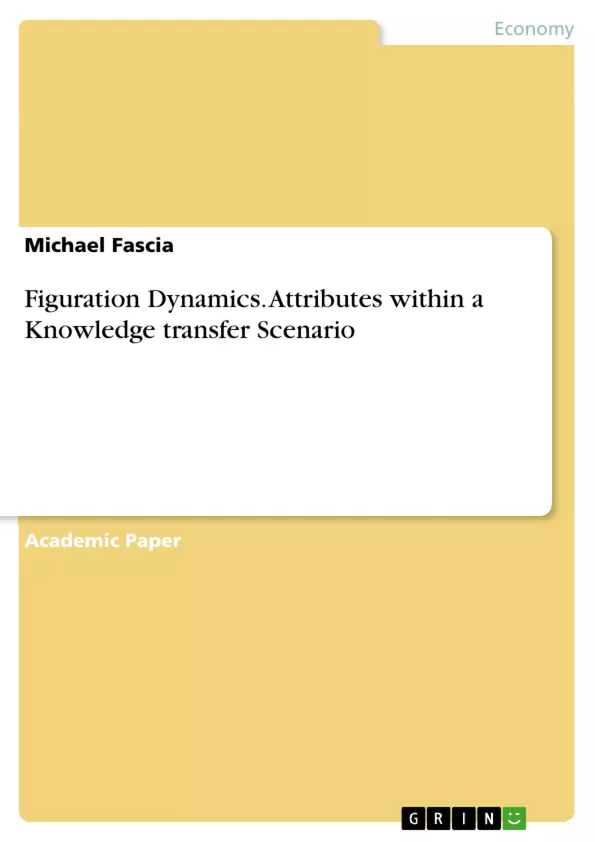In this short paper, we discuss a dialectic methodology surrounding the interpretation of knowledge transfer, and the conditional elements which can be seen to support the concept of a unity of knowledge. We discuss a differing standpoint to knowledge and knowledge value, based on the knowledge transfer practitioner's perspective, but still in a business context. We ask why, if knowledge is vital for business success and competitive advantage, the transfer of knowledge is rarely a simple unproblematic event. Further, that the creation of knowledge before transfer is recognised as a significant factor in determining a starting point for analogous scrutiny, and often under a premise of doxastic attitude. This discussion therefore aims to synthesise current literature and research into an elemental epistemic principal of Figuration Dynamics, and in doing so, may help focus congruent knowledge transfer theories.
Inhaltsverzeichnis (Table of Contents)
- ABSTRACT
- INTRODUCTION
- DISCUSSION
- DEDUCIBLE by INFERENCE
- FIGURATIONAL TACTIC
- KNOWLEDGE EXISTENCE
- PROBLEMATIC CRITERIA
- DIVERSITY
Zielsetzung und Themenschwerpunkte (Objectives and Key Themes)
This paper aims to provide a theoretical discussion of knowledge transfer and its interpretation. It explores the complex interplay of knowledge, its value, and its transfer within a business context.
- The multifaceted nature of knowledge and its elusive definition in the organizational environment.
- The significance of knowledge transfer practitioners' perspectives and their influence on the knowledge transfer process.
- The role of epistemic principles in understanding and defining knowledge transfer.
- The application of figurational sociology to overcome traditional sociological dichotomies and understand knowledge as a dynamic web of interactions.
- The challenge of defining knowledge and its impact on the interpretation of knowledge transfer.
Zusammenfassung der Kapitel (Chapter Summaries)
- ABSTRACT: This section introduces the paper's objective, which is to discuss a dialectic methodology for interpreting knowledge transfer and the elements that contribute to the concept of a unity of knowledge. It highlights the practitioner's perspective on knowledge and its value in a business context.
- INTRODUCTION: This chapter discusses the lack of a universally accepted definition of knowledge in the organizational environment. It highlights the challenges of defining and managing knowledge due to its ambiguity, dynamism, and subjective nature. The chapter also explores various philosophical perspectives on knowledge, including positivism, empiricism, rationalism, and generalist philosophy.
- DISCUSSION: This section emphasizes the immense value of knowledge for businesses and organizations. It explores the interpretive praxis of knowledge schema and argues that a focus on the philosophical grounding of knowledge within a business context is crucial.
- DEDUCIBLE by INFERENCE: This chapter emphasizes the importance of understanding the experiential reasoning behind the interpretation of knowledge before it is transferred. It highlights the role of justification within the knowledge transfer schema and underscores the need for an overriding epistemic principle to provide a baseline for critical analysis.
- FIGURATIONAL TACTIC: This section introduces figurational sociology as an alternative perspective for understanding knowledge transfer. It explains how the concept of figuration addresses the limitations of traditional sociological theories and emphasizes the interconnectedness of individuals within social networks.
- KNOWLEDGE EXISTENCE: This chapter argues that knowledge exists only because someone knows it, and it cannot be transferred as a material object. It discusses the challenges of defining knowledge and its dependence on the interpretation of foundational normality.
- PROBLEMATIC CRITERIA: This section examines the challenges associated with defining knowledge, particularly the difficulty in defining experiential primitives like personal experience. It explores the conflicting views on knowledge and the lack of a unified definition, highlighting the need for further research.
Schlüsselwörter (Keywords)
The central focus of this paper lies in the intersection of knowledge, knowledge transfer, and their philosophical interpretations. The work delves into the practitioner's perspective on knowledge and explores the significance of epistemic principles in understanding knowledge transfer. Key terms include knowledge, knowledge transfer, philosophy, perspectives, attitude, figurational sociology, epistemic principal, and knowledge value.
- Quote paper
- Michael Fascia (Author), 2016, Figuration Dynamics. Attributes within a Knowledge transfer Scenario, Munich, GRIN Verlag, https://www.grin.com/document/421147



